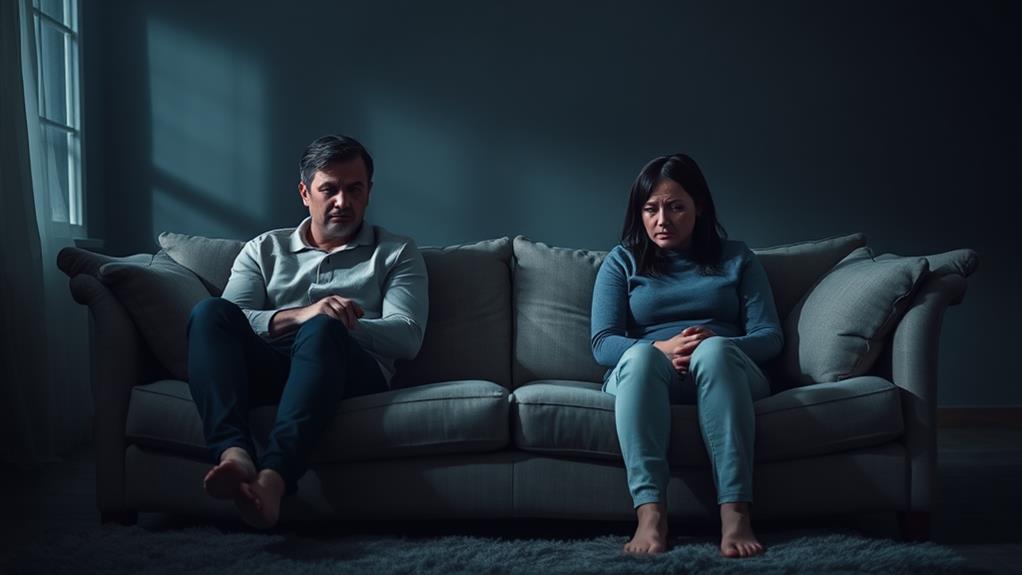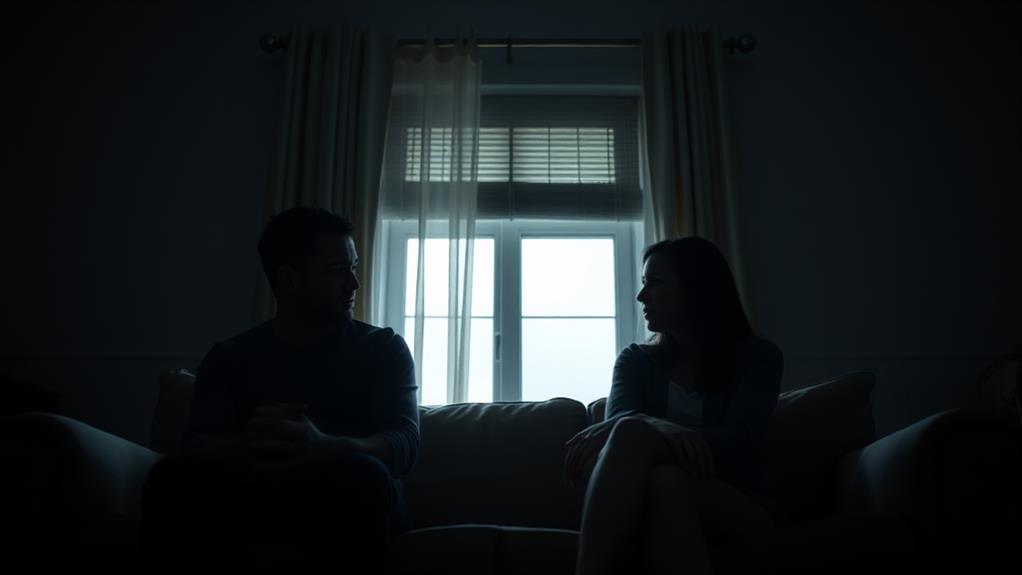You might not realize how much anxiety can impact your relationships, often creating barriers that lead to misunderstandings and emotional distance. When anxiety takes hold, it can distort communication, leaving you and your partner feeling isolated and misunderstood. But what if you could turn this around? By exploring effective strategies to bridge these gaps, you could transform your connection and foster a healthier, more supportive environment. So, how can you start to navigate these challenges together?
Understanding Anxiety in Relationships

Often, anxiety creeps into relationships, affecting how you connect with your partner. You might find yourself overthinking every little thing, wondering if they're upset or if you said the wrong thing. It's like having a tiny worry monster in your head, whispering doubts that make you second-guess yourself. This anxiety can make you feel distant, even when you're sitting right next to each other.
It's important to recognize that anxiety is normal, and you're definitely not alone. Many people experience it, especially when they care deeply about someone. You might feel butterflies in your stomach, but sometimes those butterflies turn into a full-on stampede.
When you understand where this anxiety comes from, you can start to tackle it together.
Try to focus on the positive aspects of your relationship. Remind yourself of what you love about your partner. Share your feelings with them, too. You'd be surprised how much a little honesty can help.
And hey, it's okay to laugh at your worries sometimes! Remember, relationships are about connection, and with a little effort, you can keep that connection strong, even when anxiety tries to pull you apart.
Communication Breakdown
Experiencing a communication breakdown can be one of the most frustrating aspects of a relationship. You might feel like you're talking to a wall, and your partner mightn't get what you're trying to say.
When anxiety creeps in, it often makes these misunderstandings worse. You might overthink your words, worry about how they'll react, or even avoid tough conversations altogether. It's like trying to navigate a maze blindfolded!
To tackle this, start by being honest about your feelings. Share your anxiety with your partner; trust me, they'll appreciate your openness.
Use "I" statements, like "I feel overwhelmed when…" This helps you express yourself without sounding accusatory.
Also, try to set aside dedicated time to talk. This way, both of you can focus and truly listen.
Emotional Distance

When communication breaks down, emotional distance can quickly set in. You might find yourself feeling disconnected from your partner, like you're in two separate worlds. This distance isn't always about physical space; it's more about how you feel inside. You could be sitting next to each other, but if you're not talking or sharing feelings, it's easy to feel lonely.
Anxiety can make it even tougher. You might worry about how to express yourself, which can lead to silence. And, when you're silent, your partner might start to feel confused or rejected. It's like playing a game of emotional hide-and-seek, and nobody's winning!
To bridge this gap, try to open up little by little. Share your thoughts, even if they feel silly. You can say, "I feel anxious about talking," and that's okay!
When you share your feelings, it creates a connection, like a warm hug for your heart. Remember, it's not about fixing everything at once; it's about taking small steps. With a bit of patience and understanding, you can close that emotional distance and feel closer than ever!
Misunderstandings and Conflicts
Misunderstandings and conflicts can easily arise in relationships, especially when anxiety clouds your judgment. You might misinterpret your partner's words or actions, thinking they mean something negative when they really don't. This can lead to arguments that seem to come out of nowhere, leaving both of you confused and frustrated.
When you're anxious, you might overthink things. You could start to believe your partner doesn't care or is upset with you, even when that's far from the truth. It's like wearing foggy glasses—you can't see clearly.
To avoid these misunderstandings, communication is key. Try talking openly about your feelings. Sharing what's on your mind can clear up confusion faster than a sunny day melts away fog.
Also, remember to listen actively. Sometimes, just hearing your partner's side can change everything.
And if you feel a conflict brewing, take a step back. A little humor can help too! Laughing together can lighten the mood and remind you both that you're on the same team.
Impact on Intimacy

Anxiety can greatly shape the way you connect with your partner, especially in intimate moments. When anxiety sneaks in, it can make you feel distant or even uncomfortable. You might worry about how you look or if you're good enough. These thoughts can create a wall between you and your partner, which isn't what anyone wants during those special times.
Sometimes, you might even feel like you can't relax and enjoy being close. It's like trying to enjoy a movie while someone keeps changing the channel! You might find yourself overthinking every little thing, which can lead to awkwardness instead of the warmth you crave.
But don't worry! There are ways to help ease that tension. You could try talking to your partner about how you feel. Honest conversations can open doors to understanding.
Also, practicing mindfulness or deep breathing can help calm those racing thoughts.
Anxiety's Effect on Trust
Trust often feels fragile in relationships affected by anxiety. When anxiety kicks in, it can make you question everything, even the trust you have in your partner. You might worry they don't care or that they'll leave you. These thoughts can stir up a storm of doubts, making it hard to feel secure.
When you're anxious, you might read too much into your partner's actions. If they don't text back right away, you may think they're upset or planning to break up. It's easy to jump to conclusions, but that can erode the trust you've built. Remember, your partner is likely not doing anything wrong; they might just be busy or distracted.
Building trust takes time and patience. You can help by communicating openly. Share your feelings and concerns, and encourage your partner to do the same. It's like building a bridge—sometimes you need to reinforce it with honest conversations.
Don't forget to sprinkle a little humor into those talks! Light-hearted moments can ease tension and remind you both that you're in this together.
With effort and understanding, you can strengthen the trust that anxiety tries to shake.
Coping Strategies for Individuals

When anxiety starts to affect your relationships, it's important to have coping strategies in place for yourself.
First, try deep breathing. When you feel your heart racing, take a moment to breathe in through your nose for four seconds, hold for four, then breathe out through your mouth for four. It's like giving your mind a little vacation!
Next, keep a journal. Writing down your thoughts can help you sort through all that mental clutter. You might find patterns or triggers that you didn't notice before. Plus, it's a great way to vent without worrying about judgment!
Don't forget to stay active. Exercise releases endorphins, which can boost your mood. Even a short walk can clear your head.
Lastly, talk to someone you trust. Sharing your feelings can lighten your load. Remember, you don't have to face this alone!
Supporting a Partner With Anxiety
Supporting a partner with anxiety can feel overwhelming, but your presence and understanding can make a significant difference. It's tough to see someone you care about struggle, but knowing how to help can lighten their load.
First, listen without judgment. Sometimes, they just need to vent, and having a kind ear can mean the world.
Try to be patient and avoid saying things like, "Just relax!" That's easier said than done, right? Instead, encourage them to share their feelings. Ask questions, but let them lead the conversation. You might learn a lot about what they're going through.
Also, it's helpful to create a safe space. This could mean setting aside time for relaxing activities together or simply being there when they feel anxious. Maybe you can watch a funny movie or go for a walk. Just being by their side can be incredibly comforting.
Lastly, remind them that it's okay to seek professional help. You're a great partner for supporting them, but a therapist can provide additional tools. Together, you can navigate this journey, turning anxiety into less of a hurdle and more of a manageable bump in the road.
Building Stronger Connections

Building stronger connections in a relationship requires intentional effort and open communication. It's like training for a sport; you've gotta practice to get better!
Start by setting aside time to talk. Make it a habit to check in with each other, sharing thoughts and feelings. This helps build trust and keeps the connection alive.
Be honest about your feelings. If anxiety pops up, don't hide it! Share what's on your mind. You might find your partner feels the same way. When you both open up, you create a safe space for each other. It's like saying, "Hey, it's okay to be vulnerable here."
Try to be supportive, too. Celebrate each other's wins, no matter how small. Did your partner finish a project? Throw a mini-celebration! This creates positive memories that strengthen your bond.
And don't forget to have fun together! Play games, watch movies, or go for a walk. Laughing together can lighten the mood and chase away anxiety.
Professional Help and Resources
Even with strong connections, anxiety can still creep into a relationship, making it tough to navigate. When you're feeling overwhelmed, seeking professional help can be a game-changer. Therapists and counselors specialize in understanding anxiety and its impact on relationships. They provide tools to manage emotions and improve communication, so you and your partner can feel more connected.
You might think therapy is just for emergencies, but that's not true! It can be helpful for anyone looking to strengthen their bond. Support groups are another great option. They let you connect with others facing similar challenges. Sharing stories can make you feel less alone, and you might even pick up some handy tips along the way.
Online resources, like apps and websites, offer valuable information about anxiety management. You could try mindfulness or relaxation techniques right from your phone.
And don't forget about books! Plenty of authors write about anxiety and relationships, providing insights that can help you both.

